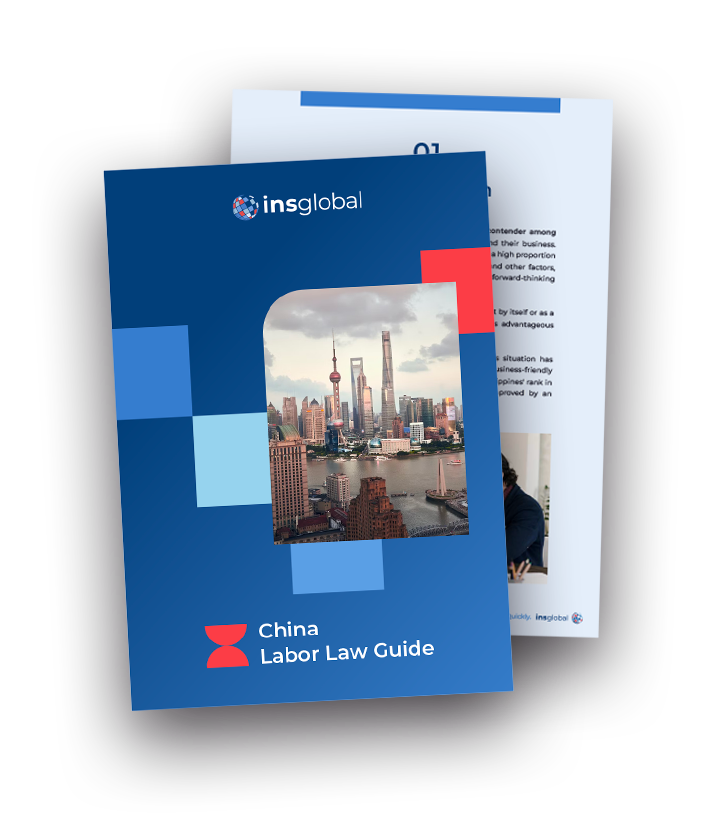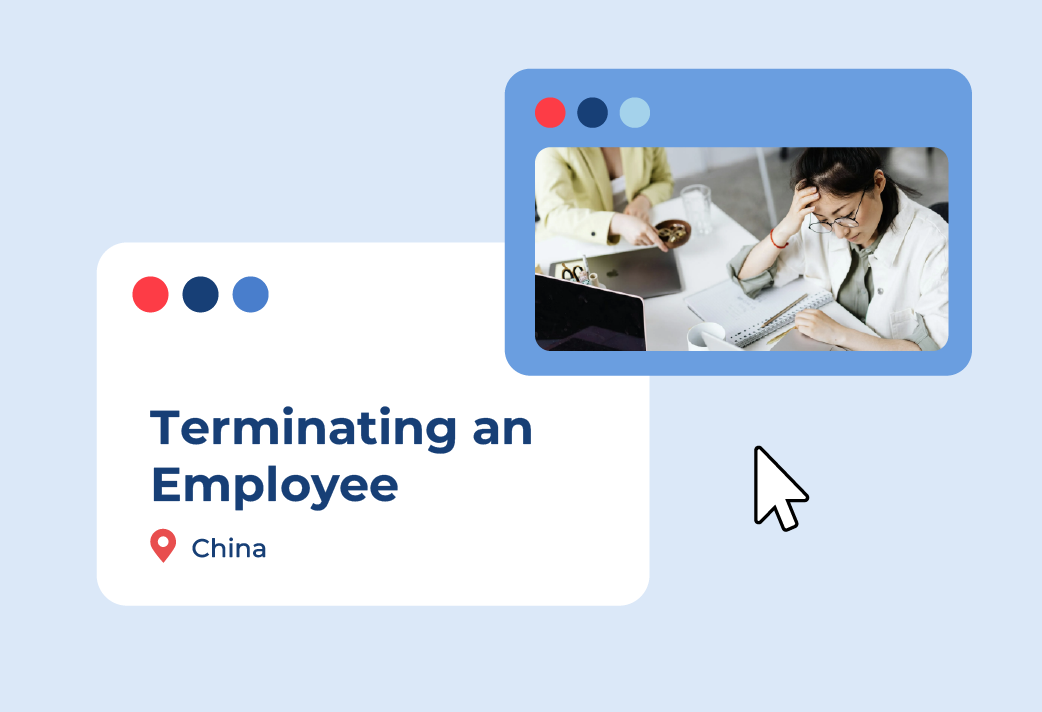Many foreign companies will find that China’s employment termination law prioritizes employee job security, making contract termination more difficult than in other countries.
While national guidelines are presented here, it is important to remember that the regional labor administration may have additional guidelines, as rules can vary considerably between jurisdictions.

Tired of scrolling? Download a PDF version for easier offline reading and sharing with coworkers
In a hurry? Save this article as a PDF
Tired of scrolling? Download a PDF version for easier offline reading and sharing with coworkers.
Fill up the form below 👇🏼
China Labor Law Guide: How to Terminate an Employee Compliantly
Chinese employment law allows an employer to set a probation period, during which it is simple to terminate the contract if the employee is unable to meet the requirements of the position.
The employer may terminate the contract without paying severance if the employee is demonstrably incompetent for the position.
Nevertheless, the employee is still under contract and is, by no means, considered an at-will employee. Moreover, the only substantive difference regarding termination between probation period and post-probation is the ease of contract termination if the employee is unable to carry out the duties of the position or deemed incompetent.

Mutual Agreement to Terminate Employment Contract
If the employer and employee mutually agree to terminate the contract, and the employer initiates the termination, the employee is entitled to severance payment. The employer may offer additional payment of any amount, with the intention of obtaining consent from the employee.
From the employer’s perspective, this is a favorable outcome as it prevents the termination from becoming an onerous and costly dispute as well as possibly resulting in intervention from local labor authorities. For the employee, this will probably also be viewed favorably (if the compensation is generous enough) because the compensation amount is guaranteed and there is lengthy dispute anticipated.
Terms and conditions of termination: The employer should formally document and communicate the terms and conditions of the termination. Without written documentation and confirmation of the terms and conditions, the employer will be liable in the future for the same issues clarified in the terms and conditions.
Termination due to Prohibited Behavior of Employee
There are several circumstances in which an employer can immediately terminate the employee without offering severance or any other compensation apart from his/her wages owed until that point:
- The employee commits a serious offense against the company’s rules and regulations: If the employer terminates the contract on these grounds, the employer is responsible for providing evidence that the employee committed the offense. Explicit details of the broken company regulation must be outlined in the employee handbook. Additionally, the company policy must sufficiently indicate that the offense is a serious one with grounds for firing. The employer must ensure that the employee was made aware of the regulation and the consequences for violation.
- The employee abandons duties of the position, resulting in a substantial material loss for the company: In this case, the employer is responsible for demonstrating that the loss was directly caused by the employee’s negligence. The causality demonstrated in the evidence should be unambiguous.
- The employee is unable to complete duties as a result of establishing a relationship with an additional employer: In this case, the employer is only able to terminate the contract after first giving the employee the opportunity to sever the outside relationship. If the employee refuses to do so, the employer may unilaterally terminate.
- The employee is convicted of a crime while under the contract: Previous criminal convictions are not grounds for termination.
Check Our China Labor Law Guide
Learn how the Chinese law is applied in all aspects and situations, from an employer and employee perspective

Other Legitimate Grounds for Employer-initiated Termination
The employee is No Longer Capable of Fulfilling the Duties of the Job
In the following cases, the employer must provide both severance payment and either 30 days’ notice or a full month’s salary.
Before terminating the contract, the employer must investigate to ensure that further training would not suffice. If training of some kind would allow the employee to continue to fulfill his/her duties, this is not grounds for termination. It is also recommended that the employer verify that a job transfer would not be an adequate solution before termination. A judge may wish to see that the employer has attempted to transfer the employee to another acceptable position prior to termination.
Changes in Company Circumstances
If the company’s needs for which the employee was hired in the first place are no longer pertinent, the employer is within its rights to bring the position to a close. A drastic change in market conditions may necessitate such a decision. Prior to terminating the employee, however, the company must first attempt to change the duties of the position to meet the company’s needs while maintaining a role for the individual that was hired.
An employer should be prepared to show a judge or official evidence that they have sought to change the position to fit other needs of the company or transfer the employee prior to termination.
The Employee is No-longer Able to Work After Illness or Injury Unrelated to Work
In this case, on top of severance payment, the employer must offer no less than 6 months wages as a medical care subsidies. The employer must also ensure (be prepared to prove) that further training is insufficient to render the employee capable of performing his or her duties.
Mass-Layoff
A mass layoff is defined as either of the following two situations:
- The company must layoff 20 or more employees
- A company must lay off more than 10% of it’s total staff
A mass layoff requires the pre-approval of the local labor bureau. The bureau may permit the move in the following circumstances:
- The company is facing serious business difficulties
- The company has filed for bankruptcy and is undergoing restructuring
- The firm’s operations, technology or methodology require a dramatic change
Employees Protected from Termination
- An employee who has both been continuously employed with the company for at least 15 years and is within 5 years of retirement.
- An employee awaiting the diagnosis of a work-related injury or disease.
- An employee whose work abilities have been compromised by work-related injury or disease.
- An employee that is pregnant, on maternity leave, or nursing.
- An employee who is in the midst of a medical treatment period for non-work-related injury or disease.
Termination Due to Dissolution of Company
In the event that the company must shut down (due to bankruptcy, revocation of business license or otherwise ordered to cease operations), the employer must pay severance to terminated employees.

Employee-initiated Termination
The employee is required to submit a formal resignation letter to HR and must give at least 30 days notice. During probation period, however, the employee is only required to give 3 days notice.
Termination of Part-time Contract
Part-time contracts are at-will and can be terminated at any time by either party.
Expiration of Fixed-Term Contract
Terminating an employee at the end of the first fixed-term contract is much simpler than terminating a live employment contract.
If the employer is unsatisfied with the employee, it simply does not need to offer a second contract. If the employer does not renew the contract, however, it must provide severance payment.
Expiration of second fixed-term contract: Following an employee’s second fixed-term contract with an employer, the company is required to make a new employment contract upon the employee’s request.
Severance Pay
In most cases, the terminated employee is entitled to severance payment (as mentioned above). There are only two circumstances in which the employee is not entitled to severance payment following termination:
- During probation, when the employee is deemed unqualified for the position.
- When the employee has engaged in prohibited behavior and is terminated immediately.
The statutory minimum severance payment is calculated as:
Average monthly wages during the previous 12 months x years of service for the company
Regulations When Calculating Severance Payment
- If the employee has worked for fewer than 12 months, the average wages of the months worked is sufficient.
- Periods of work that are less than one year should be rounded to half of a year, for calculation purposes. Between one and six months of work will be regarded as half of a year. Between 7 and 12 months of work will be regarded as an entire year. For example, if the employee has worked for 2 years and 3 months, the employee’s minimum severance compensation will be 2.5 month’s salary. If the employee has worked for 2 years 8 months, the minimum severance is 3 months salary.
- For years of work during and after 2008 (when the Labor Contract Law took effect), minimum severance pay, on a monthly salary basis, is capped at 3 times the local average wage. In other words, if the employee’s regular salary is 5 times the local average wage, his/her monthly wage multiplier will be three times the local average wage, rather than the employee’s average monthly wages of the previous 12 months.
- The required severance pay is capped at 12 months salary, even if the employee’s service at the company exceeds 12 years.
Taxability of Severance Pay in China
The Individual Income Tax burden for severance payment is much lower than otherwise. If the payment is lower than 3 times the local annual average salary, it is tax exempt. If the lump sump payment exceeds the local annual average salary, the exceeding amount will be subject to individual income tax.
Employee Termination in China: INS Global
It is important to plan for the long term when hiring, as terminating employment contracts is not always quick and simple for the employer. As the local labor ministries will often give preference to the employee, it is important to avoid basic mistakes such as failing to pay the minimum statutory severance.
As Asia’s leading PEO (Professional Employer Organization) services provider, INS Global offers expert guidance and support to companies in China and throughout Asia to terminate employees easily and compliantly.
Contact us today to discuss your HR needs.

SHARE